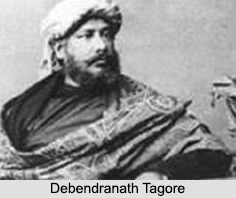 Debendranath Tagore was the founder of the Brahmo Religion in 1843, which today is identical with Brahmoism. This is the youngest religion of India and Bangladesh. Debendranath Tagore was an Indian religious reformer and Hindu philosopher. This Bengali personality is the father of Rabindranath Tagore.
Debendranath Tagore was the founder of the Brahmo Religion in 1843, which today is identical with Brahmoism. This is the youngest religion of India and Bangladesh. Debendranath Tagore was an Indian religious reformer and Hindu philosopher. This Bengali personality is the father of Rabindranath Tagore.
Early Life of Debendranath Tagore
Debendranath Tagore was born on May 15, 1817, in Kolkata, Bengal Presidency, to Prince Dwarkanath Tagore, who was an industrialist and Digambari Devi. After receiving his early education at home, he was enrolled at the Anglo-Hindu College in 1827. After attending the college for a brief period, he began supervising his family"s property and also showed interest in philosophy and religion. In 1838, his grandmother passed away and he experienced a psychological change in himself.
Family of Debendranath Tagore
Debendranath Tagore mastered the Upanishads and played a vital role in the education and cultivation of faculties of his sons. Each of Debendranath Tagore`s children is prominent in the development and sustenance of West Bengal.
Dwijendranath, Debendranath Tagore"s eldest son (1840-1926) was a skilful scholar, poet and music composer. He first started the practice of shorthand and musical notations in Bengali. He wrote extensively in various publications and translated Kalidas"s "Meghdoot" into Bengali.
Satyendranath Tagore (1842-1923) was the first Indian to join the Indian Civil Service.
Hemendranath Tagore (1844-1884) was a scientist, a spiritual prophet and Yogi of the highest order.
Jyotirindranath Tagore (1849-1925) was a scholar, artist, music composer and theatre personality.
Rabindranath Tagore (1861-1941) was his youngest son and the internationally known pioneer of art and literature in the state of West Bengal.
Debendranath Tagore`s other sons were Birendranath (1845-1915) and Somendranath.
Debendranath Tagore`s daughters Soudamini, Sukumari, Saratkumari, Swarnakumari (1855-1932) and Barnakumari were also equally talented and had the heredity instinct of art and culture within them. Soudamini was one of the first students of Bethune School and a gifted writer. Swarnakumari was a great writer, editor, song-composer and social worker. All of them were particularly famous for their beauty and rich education.
Debendranath Tagore took part in creating the heritage of Thakurbari - the House of Tagore - in the cultural heritage of Bengal, based in Kolkata.
Ideologies of Debendranath Tagore
Debendranath Tagore was a deeply pious man. His spiritual skill was at the highest order, even while he properly maintained his worldly affairs. He did not renounce his material possessions as some Hindu traditions preached, but rather continued to enjoy them in a spirit of detachment.
Debendranath Tagore was a righteous man in steady communion with God, even living within his worldly affairs. A special form of communion with God is prayer. In order to render this communion, Debendranath Tagore said that the prayer must be full of fervour, ecstatic; and the soul of him who prays during his devotions must detach itself from its material dwelling. He was often addressed, as "Maharshi Debendranath Tagore". He was the greatest religious genius India has ever produced. He was often said to be truly a successor of the great Rishis of ancient times.
Contributions of Debendranath Tagore
The Brahmo Samaj was founded in 1843 by merging his Tattvabodhini Sabha with the Brahmo Sabha. The Brahmo Sabha had diverted from its original practices after the death of Raja Ram Mohan Roy; however, Debendranath Tagore revived the importance of this Samaj.
It was largely through the influence of the Tagore family, following that of the writer Bankim Chandra Chatterjee. Bengal took a foremost role on the enlightening front as well as on the patriotic one, in the Indian Renaissance during the 19th century.
Debendranath Tagore was a true and living embodiment of that teaching of the Gita where it is mentioned as a truly wise man is never buffeted by his trials and tribulations, does not covet pleasure, and is free from attachment, fear and anger; the same is a muni. The nation lost this true saint on January 19th, 1905.






